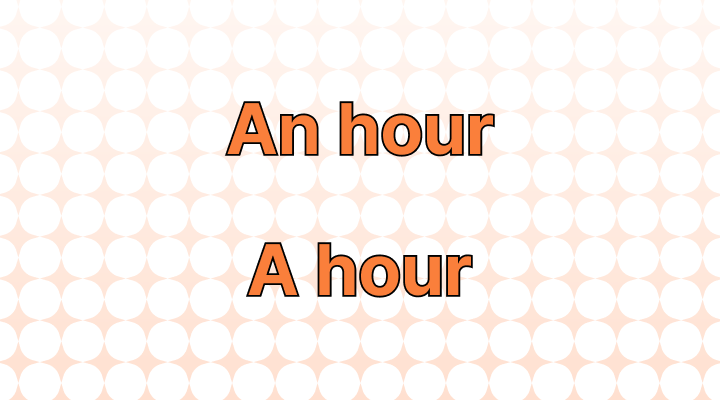An hour is the correct and standard form, while a hour is incorrect. The usage of "an hour" versus "a hour" is a common point of confusion in the English language, particularly among non-native speakers.
What does an hour mean?
"An hour" is the correct and standard form. We use "an" before "hour" because "hour" starts with a vowel sound (pronounced as 'ow-er'). This phrase denotes a unit of time equivalent to 60 minutes.
Example sentence
- I waited for an hour at the bus stop
- She dedicated an hour to her daily exercise routine.
What does a hour mean?
"A hour" is grammatically incorrect. The article "a" should be used before words that commence with consonant sounds. Attempting to use "a" before "hour" would sound awkward and incorrect to native English speakers, as it disrupts the natural flow of language.
Mastery of the correct indefinite article is crucial for clear and accurate communication in English. In the case of "hour," the correct choice is unequivocally "an hour."
Example sentences
- I go for a jog in the park every morning, and it takes me about an hour to complete my run.
- She spent an hour on the phone with her best friend, catching up on the latest news.
- The commute to work can be quite long; it usually takes me an hour to get there by train.
- The teacher gave us an hour to complete the math exam, but I finished it in just 30 minutes.
- The meeting is scheduled to last for an hour, so please be on time.
- After studying for an hour, he decided to take a short break to clear his mind.
- She read her favorite book for an hour before bedtime.
- It took them an hour to untangle the mess of wires behind the computer desk.
- The presentation was concise and to the point, lasting only half an hour.
- We waited for over an hour at the airport for our delayed flight to take off.
Common idioms/phrases
While "an hour" itself is not typically used in idiomatic expressions or phrases, the concept of time and waiting for an hour may be mentioned in various idioms and phrases. Here are a few examples:
- "The eleventh hour": This idiom refers to the last moment or the latest possible time to do something. For example, "They finished the project at the eleventh hour."
- "Kill time": This phrase means to do something to pass the time while waiting, often for an hour or more. For instance, "I'm just going to read a book to kill time while waiting for the train."
- "Time flies": This expression is used to indicate that time passes quickly, and an hour can feel like just a few minutes when you're busy or having fun. For example, "It's amazing how time flies when you're enjoying yourself."
- "In the nick of time": This idiom suggests that something happened at the very last moment, just in time to prevent a problem or disaster. For instance, "He arrived at the airport in the nick of time to catch his flight."
- "Hour of need": This phrase refers to a critical or crucial time when someone needs help or support the most. For example, "She was there for him during his hour of need."
Want to sound like a native speaker?
Engram’s AI-powered grammar checker makes your English sound like a native speaker’s, suggesting natural English expressions on top of fixing grammar, spelling, punctuation, word order, and vocabulary.

Reference:














